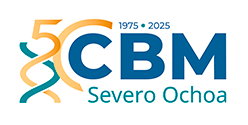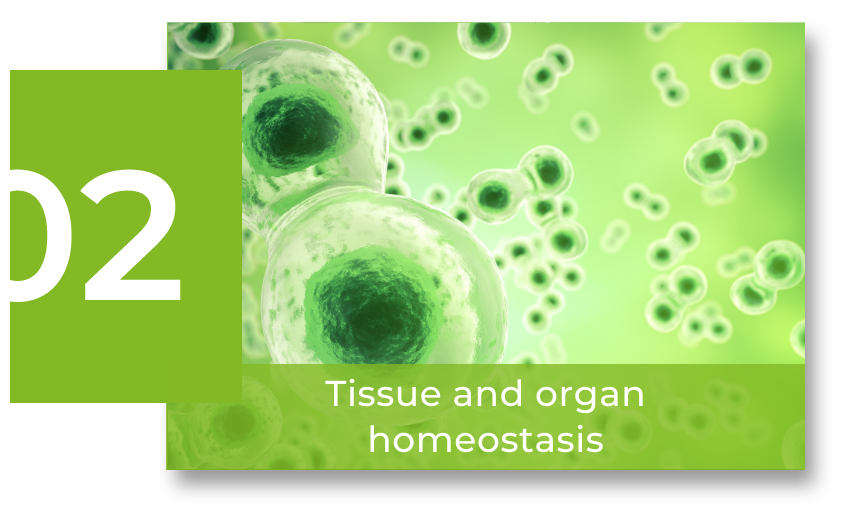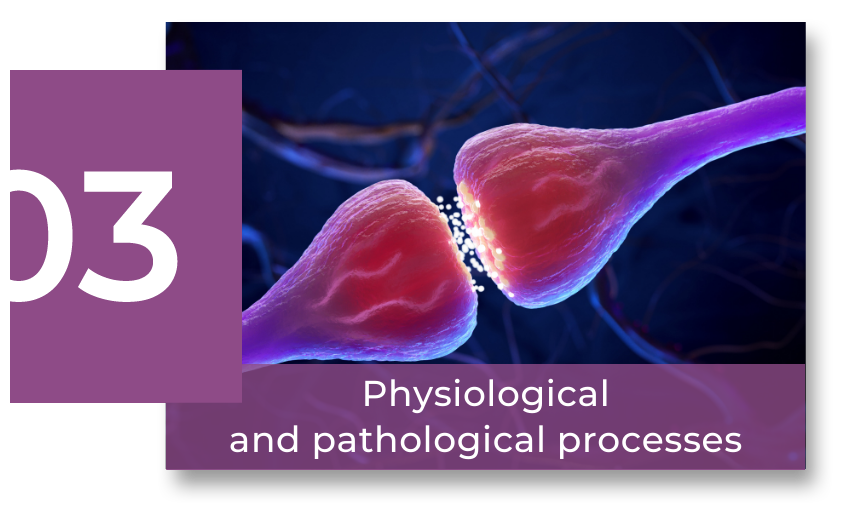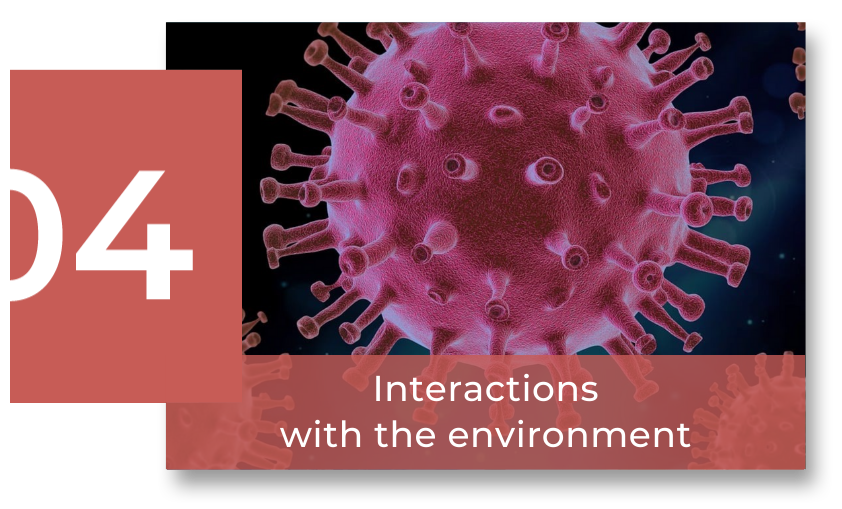Scientific Program
Physiological and pathological processes
RESEARCH GROUP
Patho-physiological implications of G protein-coupled receptors signaling networks
Understanding the complexity of signaling systems and their alterations is key to unveil the molecular basis of disease. The GRK2 signaling node is altered in certain tumors, inflammation or obesity. We investigate how cell-type specific GRK2 interactomes contribute to signaling rewiring in such pathological contexts by analyzing cellular and animal models with altered GRK2 functionality using molecular, omics and cell biology approaches.
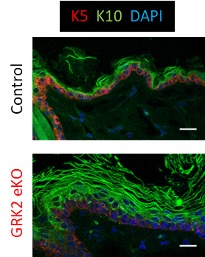
Research
The complex intercommunication among cell types in their specific tissue environment or via organ crosstalk is essential for homeostasis, while alterations in such interplays lead to pathological situations. The aim of our group is to better understand the role of key signaling nodes in the maladaptive rewiring of cellular communication pathways in disease, with emphasis on G protein-coupled receptor kinase 2 (GRK2) hub. GRK2 levels are altered in humans in prevalent cardiovascular and metabolic pathologies and in certain tumors. Therefore, understanding the molecular basis of such changes in GRK2 expression and its functional impact on cellular processes is critical to assess the feasibility of GRK2 as a useful diagnostic biomarker and/or of new therapeutic strategies based on the modulation of the activity, levels or specific interactions of this protein. In addition to its canonical role as GPCR regulator, GRK2 can directly interact with and/or phosphorylate non-GPCR components of transduction cascades. Our laboratory has pioneered the research on the characterization of different GRK2 interactomes, unveiled new mechanisms of regulation of GRK2 activity, expression and protein stability, uncovered new GRK2 substrates and interacting proteins, and first reported the participation of GRK2 in several relevant cellular processes and patho-physiological situations (angiogenesis, breast cancer, hypertension, cell cycle, cell migration, cardiac and whole-body insulin resistance). By using cellular and mouse models with altered GRK2 dosage (including tamoxifen-induced, tissue-specific deficient and/or mutant knock-in mice), we aim to gain insight on the stimuli and mechanisms triggering changes in GRK2 expression/functionality, on the impact of altering GRK2 in disease initiation and/or progression, and on the phenotypic integration of canonical and non-canonical GRK2 functions, both cell type- and tissue microenvironment-specific, in pathological conditions.
The main lines of research of our group are the following:
1. Study the role of GRK2 in the integration of tumor microenvironment (TME) cues in breast cancer. We investigate connections among tumor microenvironment stresses (such as hypoxia or stiffness), chemokine and growth factor-receptors and GRK2 interactors in the rewiring of breast cancer cells leading to metastatic features (in collaboration with P. Penela CBM lab)
2. Evaluate the impact of altering GRK2 functionality in epidermal homeostasis and keratinocyte-immune cells crosstalk. We are exploring how GRK2 deletion in keratinocytes affects the skin immune cell landscape, barrier function, skin-microbiome interaction and hair follicle homeostasis, leading to enhanced susceptibility to inflammatory diseases and squamous cell carcinomas (in collaboration with C. Ribas CBM lab).
3. Investigate the role of GRK2 in inflammation caused by Western Diets, high in saturated fats and free sugars, and its pathophysiological consequences. Specifically, we study the influence of GRK2 in myeloid cells on macrophage polarization processes and the molecular mechanisms involved, as well as the dynamics of early neutrophil infiltration in adipose tissue and the different infiltrating phenotypic subpopulations and tissular damage that can be found after diet.
These research objectives involve active collaborations with other PIs of our CBMSO Unit, as well as our participation in international and national networks (European ITN, CIBER Cardiovascular (CIBER-CV, ISCIII), the INTEGRAMUNE Madrid Biomedicine network), and our affiliation to the Instituto de Investigación Sanitaria La Princesa.
Group members

Federico Mayor Menéndez
Lab.: 320 Ext.: 4626
fmayor(at)cbm.csic.es

Cristina Murga Montesinos
Lab.: 320 Ext.: 4652
cmurga(at)cbm.csic.es

Alejandro Asensio López
Lab.: 320 Ext.: 4640

Irene García Higuera
Lab.: 320 Ext.: 4640
irene.garcia(at)cbm.csic.es
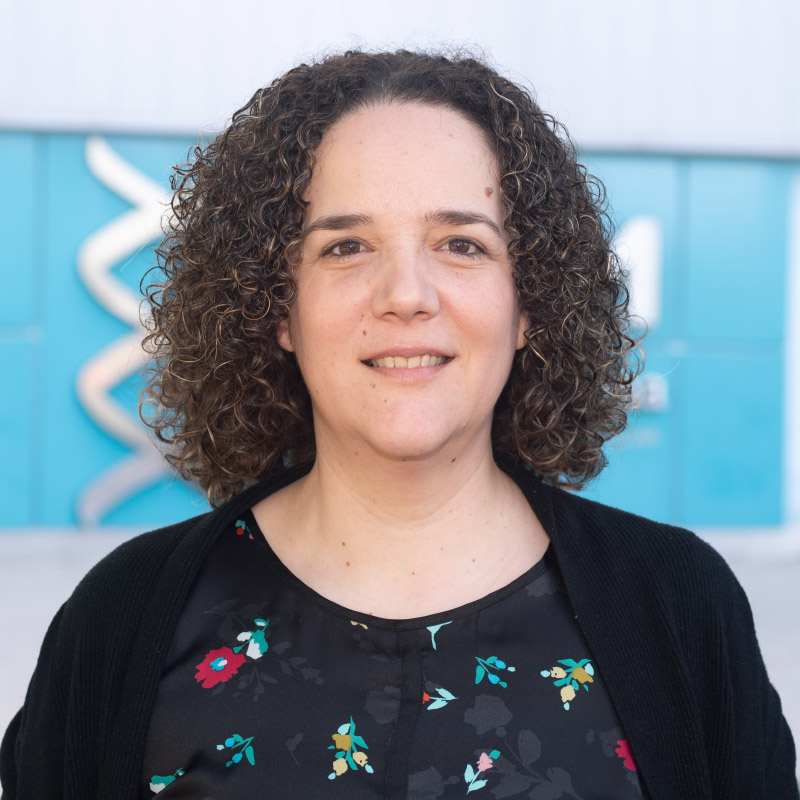
Mª Carmen Vida Rueda
Lab.: 320 Ext.: 4652
mcvida(at)cbm.csic.es

Cristina Delgado Arévalo
Lab.: 320 Ext.: 4652
cdelgado(at)cbm.csic.es

Rocío Santos Clemente
Lab.: 320 Ext.: 4652
rocio.santos(at)cbm.csic.es

Yadileiny Portilla Tundidor
Lab.: 320 Ext.: 4652
yportilla(at)cbm.csic.es

Paz López-Asiaín López
Lab.: 320 Ext.: 4640

Gabriel García Agüí
Lab.: 320 Ext.: 4652
Selected publications
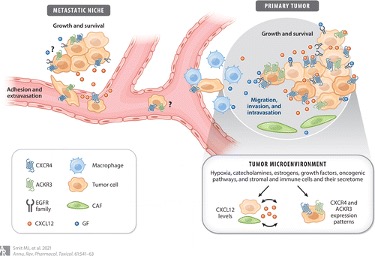
The CXCL12/CXCR4/ACKR3 Axis in the Tumor Microenvironment: Signaling, Crosstalk, and Therapeutic Targeting
Martine J. Smit et al.
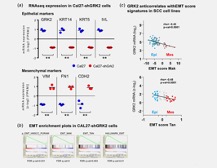
G-protein-coupled receptor kinase 2 safeguards epithelial phenotype in head and neck squamous cell carcinomas
Julia Palacios-García et al.

G Protein-coupled Receptor Kinase 2 (GRK2) Promotes Breast Tumorigenesis Through a HDAC6-Pin1 Axis
Laura Nogués et al.
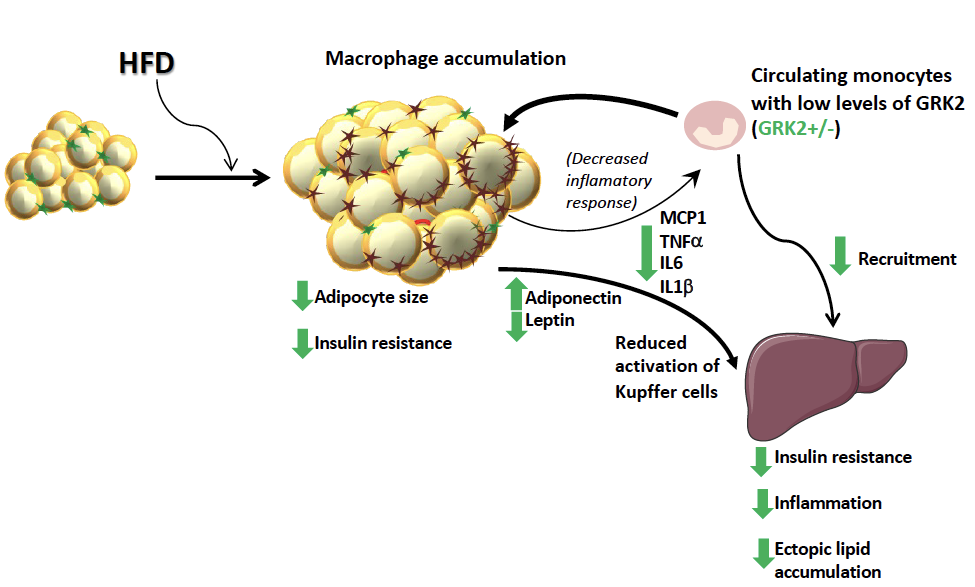
GRK2 levels in myeloid cells modulate adipose-liver crosstalk in high fat diet-induced obesity
Rocío Vila-Bedmar et al.
